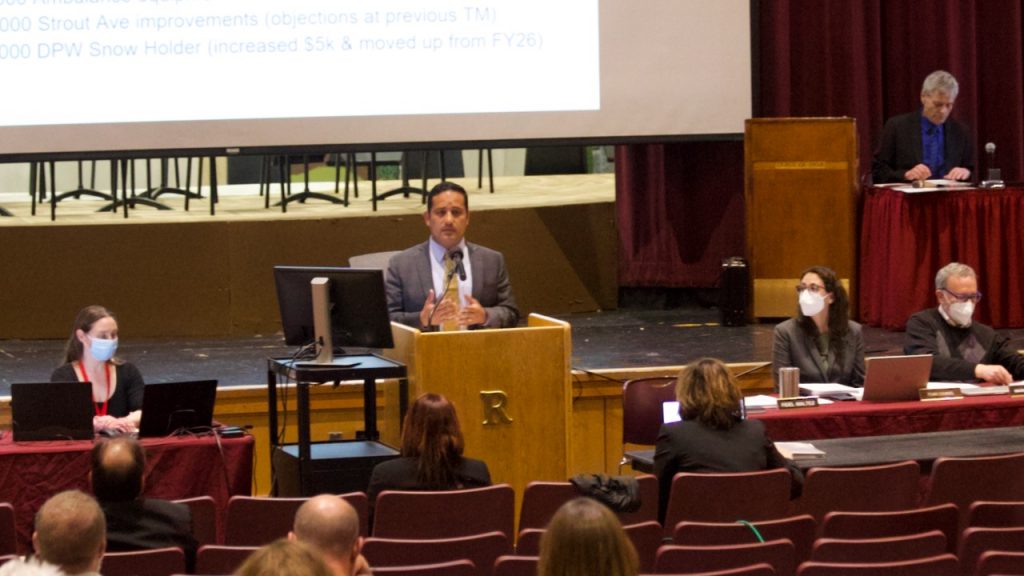
Part I of II
Reading, MA — In preparation for Annual Town Meeting, which begins on April 24, Town Manager Fidel Maltez sat down with The Reading Post to review the highlights of the town meeting warrant. The warrant, the list of items of business up for discussion at Town Meeting, is twenty-three articles long, and Maltez suggested it could take upwards of three nights to complete.
Article four asks the town to amend the capital improvement plan. Maltez shared that most of the changes are moving items out one year from where they are now scheduled. He continued to state that he has worked with the Finance Committee (FinCom) to create a capital improvement schedule that is “more financially prudent” than before.
Article five seeks to amend the Fiscal Year 2023 General Fund Budget. Maltez pointed out three items of note; the first is a pollution liability insurance policy for the former dump site, now the location of the Home Depot and Jordan’s Furniture. This is a ten-year policy, and this would be the third time the town has opted to purchase such a plan. He also highlighted an increase in Public Safety wages which is due to vacation buyback for three high-ranking employees who retired. The third is additional expenses for the Coalition for Prevention and Support, which will be funded from the opioid settlement spearheaded by the Attorney General. In total, the request is for $410,290 of additional expenses, $388,500 of which will be funded from free cash reserves.
Article nine authorizes spending limits for revolving funds and is voted on annually to update the projects still contributing to the Inspections Revolving Fund. Despite Town Meeting creating a new Affordable Housing Trust Fund in November, the legislature still needs to approve the change to the home rule charter. As a result, article ten is required in order to allocate funds to the prior fund. Maltez stated this is simply “a check the box” procedure until the legislature acts on the home rule petition.
The School Committee requested article eleven to allow them to establish a Special Education Reserve Fund. This fund would be used in upcoming fiscal years for unanticipated or unbudgeted costs for special education needs. The reserve fund would be seeded with monies unexpended from the given fiscal year’s school department budget allocation and would grow over time, not to exceed 2% of the annual net spending of the school district. Funds could only be distributed through a vote of both the School Committee and the Select Board.
Maltez noted that having a Special Education Reserve Fund would allow the School Committee to budget for other educational needs more aggressively while maintaining a “safety net” for unexpected special education needs. He also shared that FinCom discussed the issue at length, recognizing that adoption of this plan might reduce the amount of funding the school department “returns” to free cash each year. Still, FinCom also recognized the budget stability that the fund could provide. In the end, FinCom voted 8-0 to recommend the article to Town Meeting.
Article Twelve will likely be scheduled for the second night of Town Meeting as it contains the authorization for the town’s Fiscal Year 2024 budget. Maltez shared that the budget is “sensible and in line” with past budgets. He did note that energy costs were “a big blow” in the creation of the budget.
Article thirteen asks the town to authorize $900,000 in debt for the purchase of standardized rubbish and recycling carts for each household in town. Maltez indicated that the purchase of the carts will prepare the town for possible future automated rubbish and recycling collection when the contracts are renegotiated in 2026 and will lessen the financial impact on the town when the new contract is bid out. Maltez also shared that he has been in contact with several potential vendors for the rubbish and recycling contract, and most have indicated that they are going to require automated collection operation in the near future.
Maltez also believes that the new carts would provide additional benefits to the town, such as aiding rainfall accumulation issues, rodent mitigation, and cleanliness due to less litter blowing around on windy days.
If Town Meeting approves the article, the Select Board will decide at a later date on the specifics of options available to households. There is currently a survey available on the town website seeking the opinion of residents on several matters related to the carts.
The Reading Post will review warrant articles fourteen through twenty-three in Part Two of this series.
